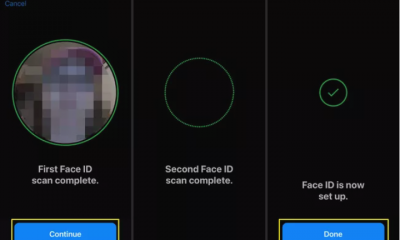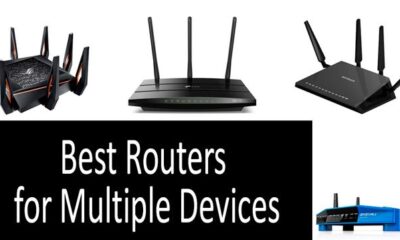Technology
What Risks Does a VPN Protect You From?

In today’s highly digital world, privacy and security of our online information is one of the most important things. Because of the increasing cyber dangers, hacker assaults, and the risk of personal information exposure, virtual private networks (VPNs) are a vital tool for everyone worried about their online security. However, to understand the protective capabilities of a VPN, we must first comprehend the risks it guards against. In this article we’ll explain to you how a VPN can help against online threats. For those eager to delve deeper, you can find more info on VPN intricacies.
1. Eavesdropping and Data Interception
When using public networks, such as Wi-Fi at airports or coffee shops, your data is particularly vulnerable. Cybercriminals can easily intercept data packets transmitted over these networks.
Bypassing Geo-restrictions: The VPN Advantage
In the vast realm of the internet, geographical boundaries shouldn’t be a constraint. Yet, geo-restrictions remain a persistent issue, limiting users to content available only in their specific region. In this context, Virtual Private Networks (VPNs) have changed the game by bridging the gap between customers and the desired material. Let’s delve deeper into how VPNs empower users to navigate around these digital barriers.
Recognizing geographic limits
Online material is subject to limitations called geo-restrictions or geo-blocks based on the user’s location. Such restrictions can be driven by a myriad of reasons, from licensing agreements for digital content to governmental regulations and censorship. A user’s location is determined by their IP address, which acts like a digital postal address, revealing the origin of a web request.
The Role of VPNs:
When a VPN is activated, it does more than just encrypt the user’s data; it reroutes this data through one of its servers located in another country. As a result, the source IP address, which originally revealed the user’s actual location, gets replaced by the IP address of the VPN server. To any online platform or service, it appears as though the web request originates from the location of the VPN server, not the user’s actual location.
Benefits of Bypassing Geo-restrictions with VPN:
1. Access to Global Content Libraries: Platforms like Netflix, Hulu, and BBC iPlayer have varying content libraries depending on the region. VPNs allow users to switch regions virtually, unlocking a treasure trove of content that might not be available in their actual location.
2. Circumventing Censorship: In countries with stringent internet regulations, several websites or platforms might be blocked. Using a VPN, residents or visitors in these countries can access the global internet without the imposed limitations.
3. Online Gaming: Some online games or gaming servers might be restricted to specific regions, or they might launch earlier in certain areas. Gamers use VPNs to access these games or servers, ensuring they’re not left behind.
4. Secure and Uninterrupted Streaming During Travels: For those who travel frequently, the annoyance of not being able to access their home country’s content is real. A VPN ensures that even when abroad, users can access their favourite shows, sports broadcasts, or news platforms just like they would at home.
5. Avoiding Localised Price Discrimination: Sometimes, digital products or services might be priced differently based on regions.
2. IP Address Exposure
As a sort of digital fingerprint, your IP address reveals information about your device, location, and online habits. It may be a target for online thieves or even companies looking to monitor your activity.
How VPN Helps: VPNs mask your original IP address, providing you with a new one from the server you’re connected to. Your genuine IP address is hidden from anyone who could abuse it thanks to this technique, which guarantees online anonymity.
3. Visiting harmful websites
Malicious websites can occasionally appear authentic and fool visitors into installing malware or giving up sensitive information.
How VPN Helps: While primarily known for encryption, many VPNs today come equipped with built-in safety measures that warn users when they attempt to access potentially harmful sites.
4. Location-based Tracking and Targeting
Websites and marketers routinely utilise location data to target users with certain content or adverts. Despite appearing innocent, this violates users’ privacy.
How VPN Helps: Since a VPN can change your IP address, it also alters your perceived location, thwarting location-specific targeting and allowing users to experience a more neutral internet.
5. Geo-restrictions and Censorship
Certain online content might be inaccessible due to geographical restrictions or censorship laws in specific countries. Users who want to obtain a wide variety of information may find this restriction to be discouraging.
How a VPN Helps: By passing via servers in many nations, VPNs enable users to get around geographical limitations and access a greater variety of material.
6. Connection Logging and Activity Tracking
Certain Internet Service Providers (ISPs) might log user activities, storing information about the websites you visit or the data you transmit.
How VPN Helps: VPNs can prevent ISPs from seeing your online activities. While the ISP can see you’re connected to a VPN, they can’t decipher the specific sites you’re visiting or the data you’re exchanging.
7. Cyberattacks and Hacking
Hackers constantly scour the internet for vulnerabilities, be it weak passwords, exposed IP addresses, or unsecured networks.
How VPNs Help: By providing an additional layer of security, VPNs significantly reduce the likelihood that a user would be singled out by hackers. Potential attack vectors are reduced by using IP addresses that are concealed and encrypted data.
8. Bandwidth Throttling
Sometimes, ISPs slow down internet speeds when detecting high-bandwidth activities like streaming or gaming.
How VPN Helps: Since VPNs encrypt data and hide online activities, ISPs cannot determine the type of content being accessed, preventing them from selectively throttling speeds.
Wrapping Up
Although VPNs are a necessary component of your cybersecurity toolkit, it’s critical to realise that they are not a cure-all. They should be used in conjunction with other security measures such as: strong and unique passwords, two-factor authentication and regular software updates.

















